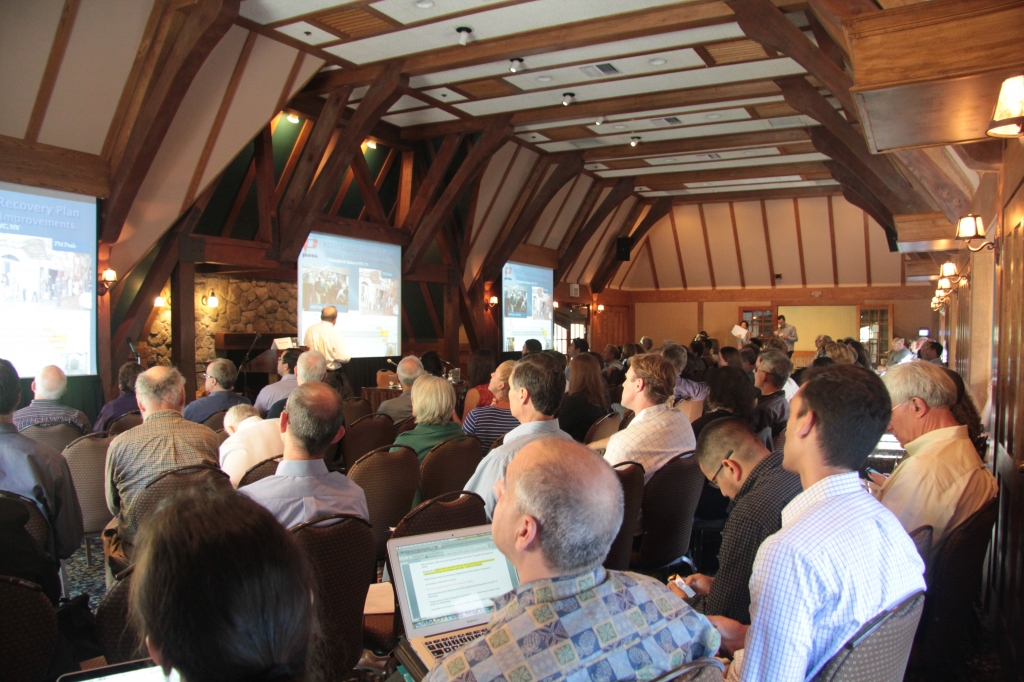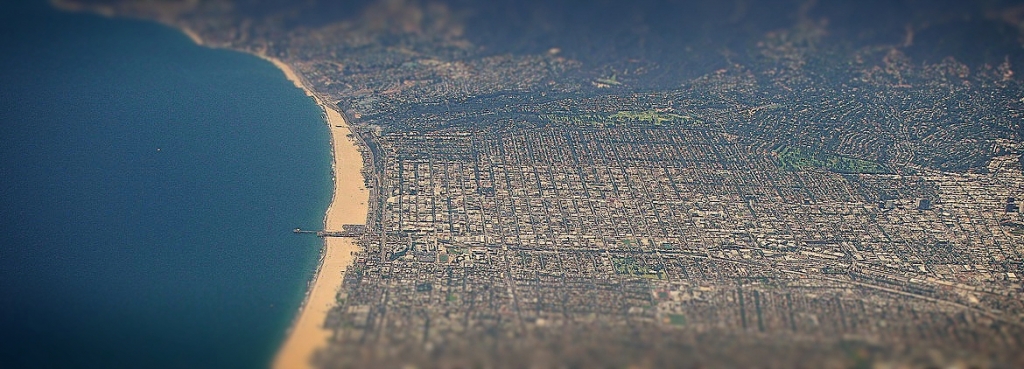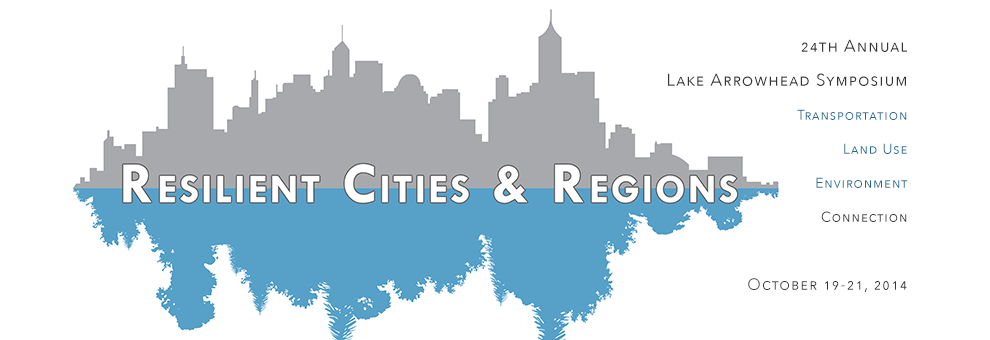Resilient Cities and Regions:
The 24th Annual UCLA Lake Arrowhead Symposium on the Transportation – Land Use – Environment Connection
Held Sunday through Tuesday, October 19th – 21st, 2014 at UCLA’s Lake Arrowhead Conference Center
2014 program and presentations
Here at the Lewis Center, we’re still basking in the positive and thought-provoking glow of the 2014 Arrowhead Symposium, which this year took a deep dive into the topic of Resilient Cities and Regions. It was the 24th annual installment of the Arrowhead Symposium, which is always an intimate, invite-only look at some topic within the broader theme of the transportation-land use-environment connection.
This year, we thought we’d try to bring some of the magic down from the mountain. We put together six stories to offer a glimpse of what this year’s symposium was like:
1. What are Resilient Cities, and Why Should We Care?
2. Bill Fulton: Planning for Resilience
3. Soft Infrastructure and the Vulnerability and Adaptive Capacity of Cities and Regions
4. Shaken, but not Stirred (to Action)?
5. Ray Quay: Anticipatory Governance, a Framework for Resilience Planning
6. Closing Comments from Director Brian Taylor
We’re quite grateful to all of our sponsors, speakers, and attendees for making it such a good experience.

2014 Sponsors
LEAD SPONSORS
California Department of Transportation
Southern California Association of Governments
CO-SPONSORS
Automobile Club of Southern California
California Air Resources Board
Cambridge Systematics, Inc.
Los Angeles County Metropolitan Transportation Authority
Majestic Realty Co.
Metropolitan Transportation Commission
Mineta Transportation Institute, SJSU
Port of Long Beach
South Coast Air Quality Management District
University of California, Davis National Center for Sustainable Transportation
The unique signature of this series is its balance, of both scholarly and practice-oriented presentations, and ideological perspectives. Recent topics include:
- Overview of Strategies for Making Connections Between Transportation, Land Use and Air Quality (1991)
- The Role of Pricing and Market-Based Strategies (1992)
- The Role of Land Use Strategies for Improving Transportation and Air Quality (1993)
- Taking Strategies from Concept to Adoption to Implementation (1994)
- Putting Advanced Technologies to Work: Promises, Prospects, and Policy Issues (1995)
- ISTEA Reauthorization: Will It Refine, Redefine, or Forge New Policy Linkages? (1996)
- Transportation and the Economy (1997)
- Inter-regional Travel and Local Development (1999)
- Growth and Quality of Life (2000)
- Reinventing Transit (2001)
- Tacking Traffic Congestion (2002)
- Finance: The Critical Link (2003)
- Linking Goods Movement to Economic Prosperity and Environmental Quality (2004)
- Healthy Regions, Healthy People (2005)
- Global Energy and Climate Change (2006)
- Planning for Growth (2007)
- The Future of Cities and Travel (2008)
- Economic Crisis as Opportunity for Reform (2009)
- Infrastructure Investment for Sustainable Growth (2010)
- Energy Policy (2011)
- Financing the Future (2012)
- Smart Technologies: Smart Policies (2013)
- Resilient Cities and Regions (2014)
Each year, the program sponsor steering committee selects a topic to be covered in various dimensions by approximately 30 academic, government, and private sector speakers from around the globe. Recent scholarly speakers include:
- Alan Altshuler and Jose Gomez-Ibanez (Harvard),
- Robert Burchell and John Pucher (Rutgers),
- Robert Cervero and Martin Wachs (Berkeley),
- Anthony Downs (Brookings),
- Genevieve Giuliano and Randolf Hall (USC),
- David Godschalk and John Kasarda (North Carolina)
| Directions to the UCLA Lake Arrowhead Conference Center (see maps below) |
From Los Angeles: Take the San Bernardino Freeway (I-10) East to the I-215 North. Travel on the I-215 for 6 miles. At Hwy 30/Mountain Resorts, bear right and exit the freeway at Waterman Avenue (Hwy 18). Turn left on Waterman Avenue and continue on Hwy 18 into the mountains for 22 miles. Turn left at Lake Arrowhead sign (Hwy 173). Follow road 2 miles down to the Lake Arrowhead Village four-way stop. Turn right at the stoplight and continue around the lake on Hwy 173 for 4-3/4 miles to Willow Creek Road. You will pass a gas station and a marina. Drive approximately 1.2 miles past the hospital turnoff and look for the Conference Center sign. Turn left onto Willow Creek Road and drive to the end of the road (about 1/2 mile). Make two right turns and you have arrived at the Lake Arrowhead Conference Center. The Main Lodge is the first building on the right as you enter the main parking lot. |
| Ground Transportation from Airports |
Ontario Airport is the nearest airport to the Conference Center. It is approximately one hour away from the Conference Center via freeway and mountain roads. Guests arriving by air may rent cars at the airport and should consider carpooling with other passengers attending the symposium. The Lewis Center will make available a limited number of shared ride vans to and from Lake Arrrowhead from select Metrolink stations and Ontario Airport. See the symposium registration site for more details. When making travel arrangements, please note that the symposium begins at 1:30 pm on Sunday, October 19th.Other AirportsBurbank (Bob Hope) – 87 miles Los Angeles International – 115 miles Orange County (John Wayne) – 80 miles Palm Springs – 80 miles San Diego International – 115 miles |
| Information | For additional information, please call the UCLA Lewis Center at (310) 562-7356 or email lewiscenter@luskin.ucla.edu. |
| Maps |   |
If you are interesting in becoming a sponsor for the event, the following six sponsorship levels are offered:
– Diamond Sponsor $20,000 +
– Platinum Sponsor $10,000 +
– Gold Sponsor $7,500
– Silver Sponsor $5,000 +
– Sponsor $2,500 +
– Cooperating organizations
For additional information, please refer to the Sponsorship Information Sheet.
To become a sponsor please contact Todd Gauthier by phone at (310) 562-7356 or email at lewiscenter@luskin.ucla.edu.
Recent Sponsors and Cooperating Organizations
LEAD SPONSORS
California Department of Transportation
Southern California Association of Governments
CO-SPONSORS
Automobile Club of Southern California
California Air Resources Board
Cambridge Systematics, Inc.
Los Angeles County Metropolitan Transportation Authority
Majestic Realty Co.
Metropolitan Transportation Commission
Mineta Transportation Institute, SJSU
Port of Long Beach
South Coast Air Quality Management District
University of California, Davis National Center for Sustainable Transportation
COOPERATING ORGANIZATIONS
Bay Area Air Quality Management District
California Energy Commission
California State University, Long Beach
California State Polytechnic University, Pomona
California Transportation Commission
Coalition for Clean Air
CSUSB Leonard Transportation Center
Fixing Angelenos Stuck in Traffic
Federal Highway Administration
Federal Transit Administration
Los Angeles World Airports
METRANS Transportation Center, USC/CSULB
Orange County Transportation Authority
RAND Corporation
Sacramento Area Council of Governments
San Bernardino Associated Governments
San Diego Association of Governments
San Francisco County Transportation Authority
San Francisco Municipal Transportation Agency
Sierra Club
Southern California Edison
Southern California Gas Company
UC Davis, Environmental Science & Policy
UC Irvine, School of Social Ecology
UC Riverside, Bourns College of Engineering CE-CERT
Urban Land Use and Transportation Center, UC Davis
UCLA Luskin Center for Innovation
UCLA School of Law
Union Pacific Railroad
U.S. Environmental Protection Agency
